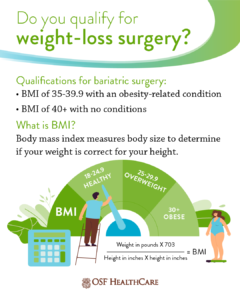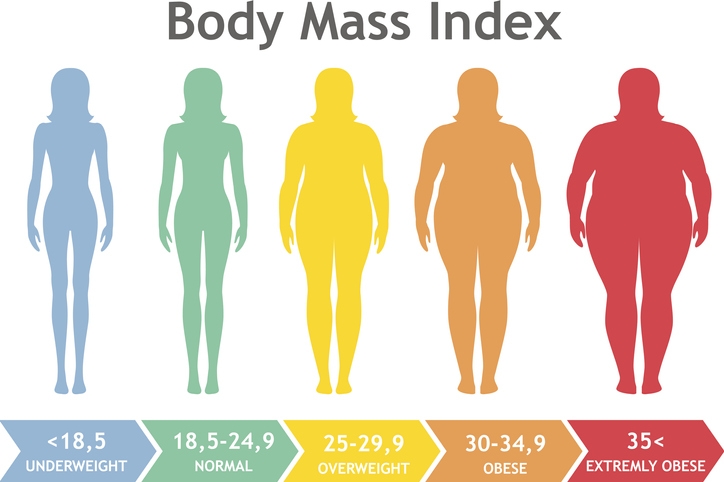
How Do You Know If You Need Weight Loss Surgery
Weight loss surgery can be a life-changing decision. But how do you know if it’s right for you?
For many, it’s not an easy choice. Weight loss surgery, also known as bariatric surgery, is a significant medical procedure. It’s not just about shedding pounds; it’s about improving health and quality of life. This surgery can help those who struggle with severe obesity and related health issues.
How Do You Know If You Need Weight Loss Surgery? To learn more…
It’s crucial to understand that this is a serious step, not a quick fix. Doctors often recommend it when other weight loss methods fail. Knowing if you need this surgery involves understanding your health, lifestyle, and goals. Let’s explore the factors that might indicate if weight loss surgery is a suitable option for you.

Credit: www.osfhealthcare.org
Signs You Might Need Surgery
Struggling with severe obesity despite trying various diets and exercises might indicate a need for weight loss surgery. Frequent health issues like diabetes or high blood pressure could be signs to consider surgical options. Consult a doctor to understand potential benefits and risks.
Embarking on a weight loss journey is never easy, especially when you’ve tried every diet and exercise plan with little success. Sometimes, weight loss surgery becomes a necessary option. But how can you tell if it’s the right choice for you? Understanding the signs that you might need surgery can help you make an informed decision about your health and future.
###
Persistent Health Issues
If you’re dealing with ongoing health problems related to your weight, surgery might be a viable option. Conditions like type 2 diabetes, high blood pressure, or sleep apnea can severely impact your quality of life. Has your doctor mentioned that these issues are directly tied to your weight?
Imagine waking up refreshed after a good night’s sleep, free from the interruptions of sleep apnea. Weight loss surgery can potentially resolve these issues, allowing you to live a healthier, more active life. Consider how much your health conditions limit your daily activities and overall happiness.
###
Failed Weight Loss Attempts
Have you tried countless diets and exercise routines without seeing significant results? This can be incredibly frustrating and demotivating. Weight loss surgery is often recommended for those who have repeatedly failed to achieve sustainable weight loss through traditional methods.
Reflect on your past attempts. Did you lose weight only to gain it back later? Surgery could be the tool you need to maintain long-term weight loss, breaking the cycle of yo-yo dieting. It’s important to recognize that surgery isn’t a quick fix but a step towards a healthier lifestyle.
When considering surgery, ask yourself if you’re ready for the commitment it requires. It’s not just about losing weight; it’s about embracing a new way of living. Are you prepared for the changes that come with it?
By examining these signs closely, you can determine if weight loss surgery is the right path for you. It’s a decision that should be made with careful consideration and professional guidance. Make sure you’re choosing what’s best for your unique health needs and life goals.
Types Of Weight Loss Surgeries
Weight loss surgery can be a life-changing decision for many. Understanding the different types of surgeries helps in making an informed choice. Each type has unique methods and benefits. Knowing these can guide your path to better health.
Gastric Bypass
Gastric bypass is a common weight loss surgery. It involves creating a small stomach pouch. This pouch connects directly to the small intestine. This process limits food intake. It also reduces calorie absorption. Patients often experience significant weight loss. Gastric bypass also helps improve obesity-related conditions. Health improvements can include diabetes and hypertension relief.
Sleeve Gastrectomy
Sleeve gastrectomy is another popular surgery option. It involves removing a large portion of the stomach. The remaining section forms a sleeve-like shape. This drastically reduces stomach size. The smaller stomach limits food intake. It also decreases hunger hormones. This leads to effective weight loss. Many patients see improved health outcomes. This includes better control over blood sugar and cholesterol levels.
Eligibility Criteria
Weight loss surgery can change lives. But not everyone qualifies for it. Doctors follow strict criteria to ensure patient safety and success. Understanding these criteria is the first step.
Bmi Requirements
Body Mass Index (BMI) is a key factor. A BMI of 40 or higher often qualifies. Those with a BMI of 35 to 39.9 may also be eligible. This applies if they have serious health issues like diabetes or high blood pressure.
Age Considerations
Age matters too. Weight loss surgery is usually for adults. Most candidates are between 18 and 65 years old. Younger and older patients may qualify with special approval. This is if their health risks are severe.

Credit: www.drmalladi.com
Benefits Of Weight Loss Surgery
Weight loss surgery offers various benefits for those struggling with obesity. It isn’t just about shedding pounds. Surgery can significantly improve health and overall life quality.
Health Improvements
Weight loss surgery can reduce the risks of serious health conditions. Many patients experience lower blood pressure after surgery. Diabetes management becomes easier as weight decreases. Joint pain often lessens, allowing more physical activity. Sleep apnea symptoms can improve, leading to better rest.
Cardiac health can also see benefits. Reduced weight often leads to a healthier heart. Lower cholesterol levels are common among post-surgery patients. These changes contribute to a longer, healthier life.
Quality Of Life Enhancement
Life quality often improves after weight loss surgery. Confidence levels tend to rise as body image improves. Many find it easier to participate in social activities. Moving around becomes more manageable with less weight.
Daily tasks become less tiring and more enjoyable. Clothing options expand as the body changes. Many individuals experience a boost in self-esteem. This often leads to a more positive outlook on life.
Family and social interactions can improve significantly. As physical activity becomes easier, engagement in community events rises. These changes foster stronger connections with loved ones.
Potential Risks And Complications
Weight loss surgery can change lives. Yet, it carries risks and complications. Knowing these helps in making an informed decision.
Before choosing this path, understanding potential risks is crucial. It ensures you are well-prepared for what may come.
Surgical Risks
All surgeries have risks. Weight loss surgery is no different. Possible risks include infection, bleeding, and blood clots.
Some patients may experience adverse reactions to anesthesia. This can lead to serious complications.
Leaks in the gastrointestinal tract might occur. These leaks can cause severe infections.
Discuss these risks with your surgeon. It’s important to know what could happen.
Nutritional Deficiencies
Weight loss surgery changes how your body absorbs nutrients. This can lead to nutritional deficiencies.
Common deficiencies include vitamins B12, D, and iron. Calcium levels may also drop.
Deficiencies can cause fatigue, weak bones, and other health issues. Regular check-ups and supplements help manage these risks.
Dietary changes are essential. A balanced diet supports your health after surgery.
Preparing For Surgery
Weight loss surgery might be needed if your health is at risk due to obesity. Medical advice helps determine the necessity based on your body mass index and health conditions. Consulting with a healthcare provider provides clarity on whether surgery is the right option for you.
Preparing for weight loss surgery is a crucial step in your journey towards better health. This phase isn’t just about scheduling a date on the calendar—it’s about setting yourself up for success. Understanding what you need to do before the procedure can help ensure a smoother recovery and more effective results. Let’s dive into some practical steps you can take as you prepare for this life-changing event.
Lifestyle Changes
Before you undergo weight loss surgery, adopting healthier habits is essential. Small changes in your daily routine can make a big difference. Start by incorporating more whole foods into your diet, like fruits, vegetables, and lean proteins.
Physical activity should also become a regular part of your life. Even a simple 20-minute walk can boost your mood and energy levels. Ask yourself, how can you fit more movement into your day?
Reducing stress is another key component. Practice relaxation techniques such as deep breathing or meditation. These habits not only prepare your body for surgery but also help you maintain long-term success.
Medical Evaluations
Your healthcare team will guide you through several medical evaluations to ensure you’re ready for surgery. These assessments might include blood tests, imaging studies, and heart checks. They help identify any potential risks and tailor the procedure to your needs.
Understanding your medical history is vital. Share any concerns or past issues with your doctor openly. This transparency allows them to provide the safest and most effective care possible.
These evaluations also offer an opportunity to learn more about the surgery and its implications. Don’t hesitate to ask questions. What are the potential risks? What is the expected recovery time? Being informed empowers you to take charge of your health journey.
Post-surgery Expectations
Weight loss surgery is a significant decision that can lead to life-changing results. However, it’s important to know what to expect after the procedure. Adjustments are necessary for a smooth recovery and to make the most out of your new lifestyle. Understanding the recovery process and dietary adjustments can prepare you for the journey ahead.
Recovery Process
After weight loss surgery, your body needs time to heal. Expect to spend a few days in the hospital under professional care. Once home, rest is crucial. You might experience fatigue and need to take it easy for a couple of weeks.
Regular follow-ups with your surgeon or healthcare team are essential. These visits ensure your recovery is on track. They also provide a chance to address any concerns or complications. Are you ready to prioritize your health and recovery?
Dietary Adjustments
Your diet will change significantly after surgery. Initially, you’ll consume liquids and gradually move to soft foods. Chew thoroughly and eat slowly. This helps your body adjust to smaller portions.
Protein becomes a key component of your meals. You’ll need to include protein shakes or bars to meet your nutritional needs. Hydration is equally important; sip water throughout the day to stay hydrated.
Consider seeking advice from a nutritionist or dietitian. They can tailor a meal plan suited to your new lifestyle. How will you adapt to these dietary changes for long-term success?
Long-term Success Factors
Considering weight loss surgery is a big decision. It’s not just about shedding pounds; it’s about transforming your life for the long haul. Success doesn’t happen overnight. It requires dedication and a plan that supports lasting change. Let’s dive into some key factors that can help ensure your long-term success after weight loss surgery.
How Do You Know If You Need Weight Loss Surgery? To learn more…
Exercise Routine
Building a consistent exercise routine is crucial. It’s not about running marathons; it’s about finding activities you enjoy and can maintain. Start small. A daily walk can do wonders for both your physical health and mental well-being.
Think about what you love. Dancing, swimming, or even playing a sport can be great ways to stay active. Your body will thank you, and you’ll feel more energized.
Have you ever tried tracking your progress? It can be incredibly motivating to see how far you’ve come. Celebrate small victories, and don’t be afraid to mix things up to keep it exciting.
Support Systems
Having a strong support system can make all the difference. Who’s in your corner? Family, friends, or even support groups can provide encouragement when you need it most.
Share your goals with them. When others know your objectives, they can help hold you accountable and cheer you on. It’s easier to stay committed when you have people rooting for your success.
Consider joining online communities or local groups where you can connect with others on a similar journey. Sharing experiences and tips can be incredibly empowering and offer fresh perspectives.
Weight loss surgery is just one part of your journey. It’s the lifestyle changes and support systems that pave the way for long-lasting success. Are you ready to take these steps towards a healthier you?
:max_bytes(150000):strip_icc()/post-weight-loss-surgery-tips-3156808-v2-3081ccf2b098490b976a3a6d935a1be8.png)
Credit: www.verywellhealth.com
Frequently Asked Questions
At What Point Do You Need Weight-loss Surgery?
Weight-loss surgery is considered when BMI is 40 or higher, or 35 with serious health conditions. It’s for individuals who struggle with traditional weight-loss methods and have obesity-related health issues like diabetes or heart disease. Consulting a healthcare professional helps determine if surgery is the right choice.
How Do I Know If I Qualify For Weight-loss Surgery?
You may qualify for weight-loss surgery if you have a BMI over 40 or a BMI over 35 with obesity-related conditions. Consult your doctor for a detailed assessment and recommendations based on your health and medical history.
How Much Do You Have To Weigh Before You Can Have Weight-loss Surgery?
Candidates for weight-loss surgery typically need a BMI of 40 or higher. A BMI of 35 with obesity-related conditions may also qualify. Always consult a healthcare provider for personalized advice.
Can You Get Gastric Bypass At 200 Lbs?
Gastric bypass is usually considered for individuals with a BMI of 40 or higher. Those weighing 200 lbs may qualify if they have a BMI of 35+ with serious health conditions. Consultation with a healthcare provider is necessary to evaluate eligibility based on specific health factors and personal circumstances.
Conclusion
Deciding on weight loss surgery is a personal choice. Consult with your doctor. Evaluate your health conditions carefully. Consider your weight loss goals. Surgery might help if other methods fail. Always research and understand the risks. Take time to decide.
Your health matters most. Discuss options with loved ones. Make an informed decision for a healthier future.







